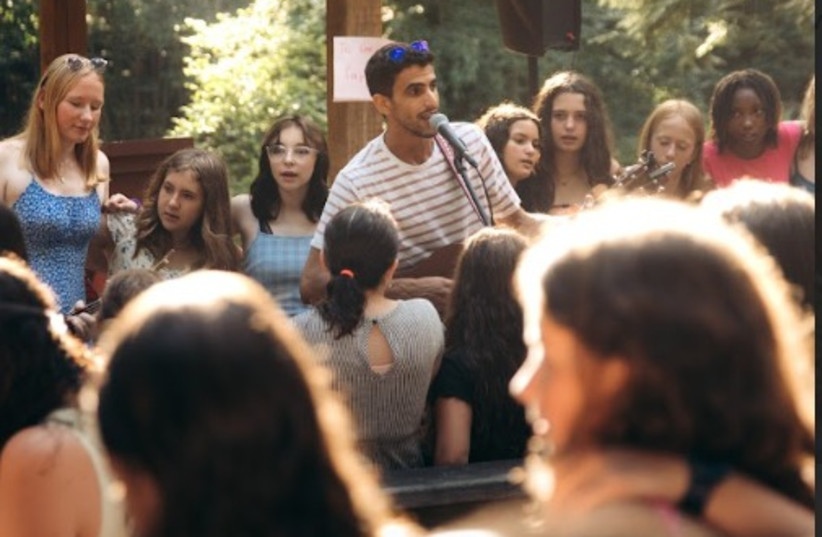In the last several weeks, as parents have registered and paid for this summer’s camp season, a handful of families in New York City found themselves hung up on one day in their camp’s traditional programming.
“In the past we know the Y has celebrated ‘Israel Day’ in various forms,” the families wrote in an open letter to Camp Twelve Trails, a Jewish day and overnight camp for 5- to 16-year-olds operated by three Jewish community centers in northern Manhattan, the Bronx and Westchester County.
“We call on you to honor your stated commitments to creating a welcoming environment in which all lives are respected by dropping any celebration of Israel from planned programming,” they continued. “We further note that in the current context there can also be no neutral celebration of ‘Israeli culture.’”
The camp has not said it is making any changes in response to the letter; it is continuing to hire Israeli staff as it has done in previous summers. And none of the signatories that JTA was able to identify responded to requests for comment. Still, the letter offers a stark sign of how Jewish camps are facing added pressure this summer over how they present and discuss Israel, given the ongoing Israel-Hamas war.
Before the war, Jewish camps were already experiencing pressure from some graduates who said they had contributed to a sanitized and incomplete picture of Israel in the American Jewish imagination. An effort among lifelong campers-turned-counselors to infuse Palestinian and anti-occupation perspectives into Israel education gained steam several years ago.

Now, Israel is attracting even more attention in the popular discourse, with a significant number of Americans, particularly young adults, saying they do not support Israel’s war against Hamas. And parents are joining in with staffers and campers in raising concerns about the celebrations of Israeli culture that remain standard fare in American Jewish camps.
Calls to center Palestinian narratives
In an anonymous op-ed published in The Forward titled “Dear Jewish summer camps: It’s time to tell our children the truth about Israel and Palestine,” one parent called for American Jewish camps to center Palestinian narratives alongside Israeli ones.
“This year, we wonder if the horrors of and since the Oct. 7 attacks might shift the ways that camp approaches talking about Israel,” they write. “It seems that this period of intense grief and pain could drive camp’s leaders and educators to bring new nuance and complexity to the curriculum, emphasizing a sense of shared humanity, and acknowledging that Jewish and Palestinian freedom are intertwined.”
They add: “So far, we don’t have much reason for hope.”
Jamie Simon, the chief program officer for the Foundation for Jewish Camp, said that most Jewish camps are explicitly Zionist — putting them at odds with the minority of American Jews who identify as anti-Zionist. But she said each family should do research to choose the camp that they best align with on Israel education.
“There’s many camps doing it many different ways, and so if they’re looking for a pro-Israel approach with no questions and no thinking about different viewpoints, there’s some camps for them,” Simon said. “If they’re looking for camps that are thinking about Palestinians in Gaza, and the diversity of thought, and they might still love Israel, but also sometimes question Israeli policies, there’s camps for them.”
Striking the right notes isn’t going to be easy, Simon said. “All the camps are trying to sort of balance centering Israel education and their values around Israel with also being a big tent and trying to be inclusive of the diversity of their communities,” she added.
The Twelve Trails letter — which is addressed to the leadership of both the YM & YWHA of Washington Heights and Inwood and Camp Twelve Trails — appears to call for a wholesale exclusion of Israel from the camp curriculum. The letter says it comes from Jews and non-Jews, some of whom lost loved ones on Oct. 7.
“We are horrified by Israel’s decision to use the tragedy of that day to justify great violence against the Palestinian people,” the letter says. “We also know that there is nothing in Judaism or Jewish culture which requires celebration of Israel.”
In a statement to JTA, Martin Englisher, CEO of the Y, one of the camp’s operators, pointed to the diversity of the community and his organization’s commitment to “providing high quality programming and services for all who choose to participate.” He did not directly refer or respond to the letter. The camp’s director did not respond to a request for comment.
“As a Jewish community center, the Y supports Israel’s right to exist as the homeland of the Jewish people,” the statement continued. “We affirm and celebrate our connection with the history and culture of Israel and the Jewish people, including programming for special days, and the inclusion of staff from Israel in various programs. We do not take political positions.”
Gal Atia, the director of a Jewish Agency for Israel program that places Israeli staff at North American Jewish camps, called the Twelve Trails letter, which he had seen, “a really extreme situation.” But he acknowledged that pushback from parents regarding Israel can be “a huge challenge.”
The bottom line, he said, is that when a camp chooses to hire Israeli staff, that itself is a statement — one that he said is worth the possible discontent.
“I told [the Israeli counselors], I’m willing to have you feel a little bit uncomfortable sometimes, and not pay the price of a child that won’t be exposed to you and your story,” Atia said. “With or without that ‘Israel Day’ or whatever, your presence, as [an] Israeli, is the connection we want to make. It’s the meaningful relationship that counts more than the big activities.”
